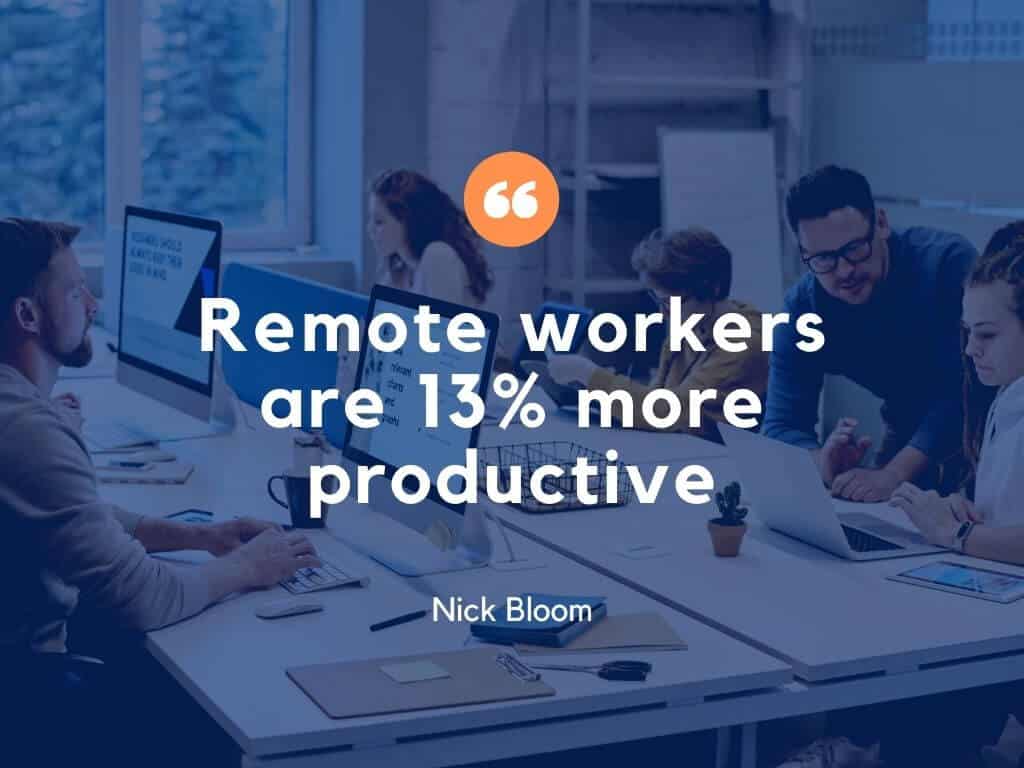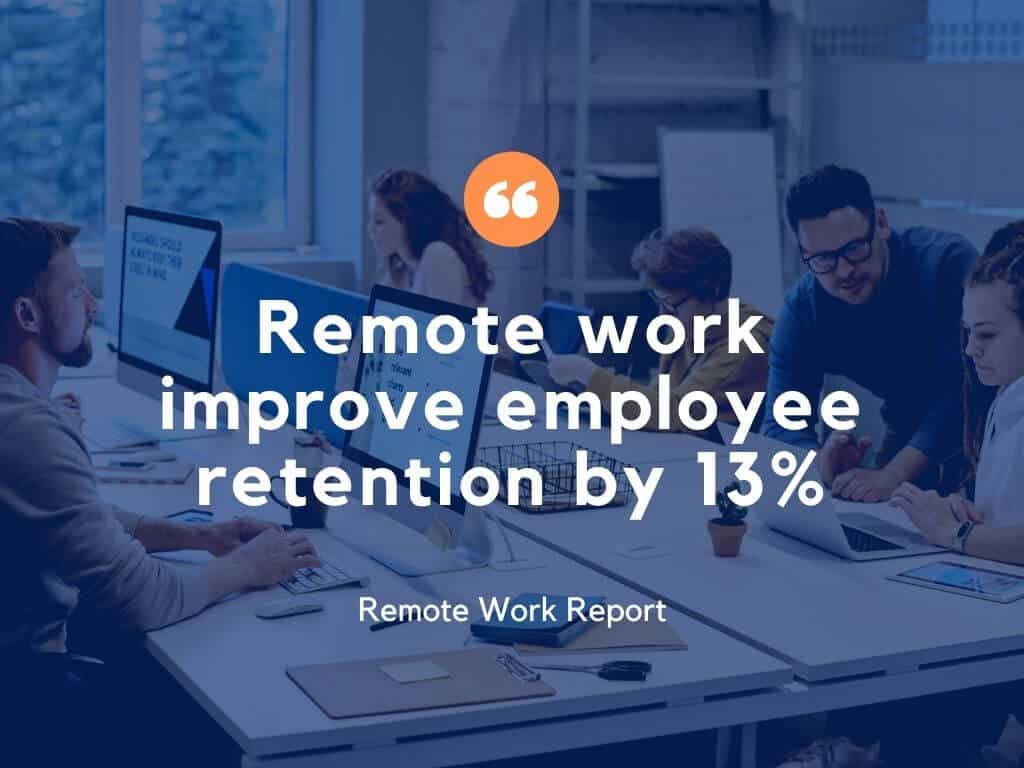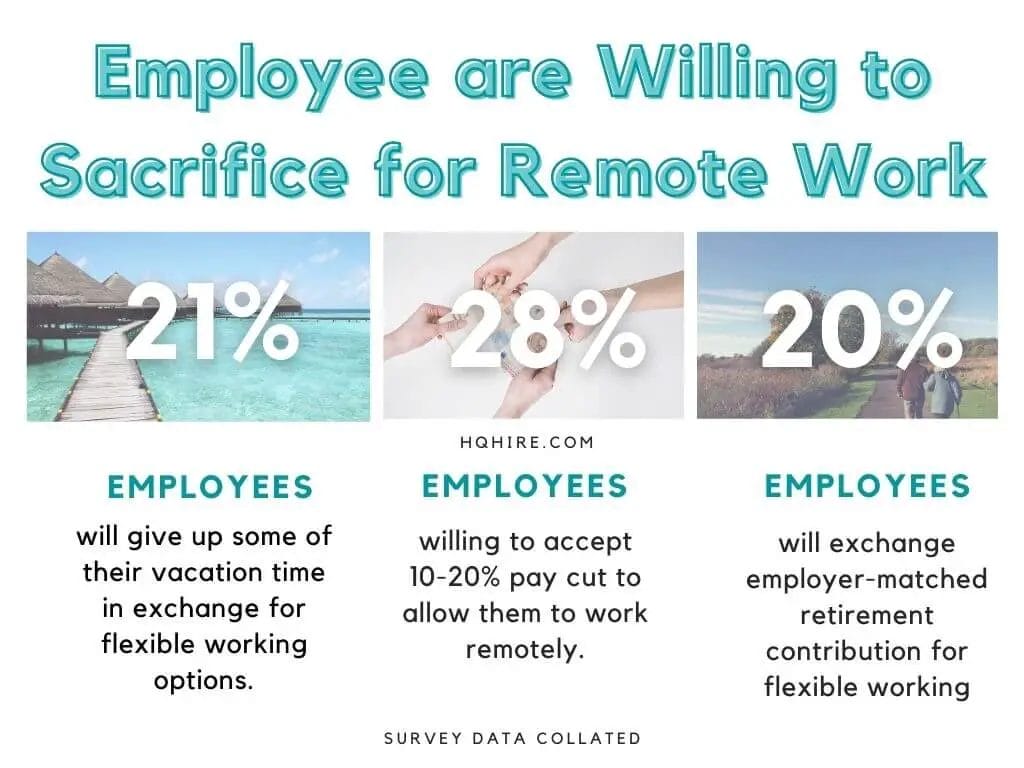Today, millions of Americans, Canadians, and people around the world are moving to work remotely. New collaborative tools, ways of communication, and technology have changed the way we think about working from home.
As we’re entering the age of the “digital nomads” where travelling the world and working from anywhere with an internet connection become possible.
With many benefits of remote work, the question of how remote work has affected the worker’s productivity is still left unanswered. Thus, here are some surprising facts about current work from home statistics that give us a glimpse of the future of work.
Top Helpful Remote Work Statistics on Shifting Norms and Expectations (Editor’s Top Pick)
- Employees are 13% more productive working from home.
- 86% of employees preferred to work alone for better productivity.
- 74% of employees will quit their current job for flexible work options.
- Remote working employees are 3 times more likely to earn more than $100,000 per year.
- Remote work using less aircon, less heating, and less paper will have the same impact as planting 91 million trees.
Recommended: How to set up your ergonomic home office! (Complete Guide)
Work From Home Productivity Studies
Remote workers are 13% more productive
A study was conducted recently by a team led by Stanford professor Nick Bloom, where they compared those who are working remotely and those who work onsite.
How much more productive are remote workers?
The study shows that there is a 13% increase in productivity for those who are working remotely.
The researcher dissected the results and attributed the 13% increase due to the following factors:
- 9% increase due to the remote workers taking shorter coffee breaks.
- 4% increase due to less distraction in the work environment.
In addition, remote workers reported a higher level of happiness compared to their on-site counterparts.

Remote workers focus better
Over the last decade, most offices are configured with an open office space layout.
Tech companies, especially those found in Silicon Valley embrace this layout. This particular configuration allows the ease of collaboration and a free flow of ideas.
But a study from 2008 to 2014 shows that the number of employees who find it harder to focus has also increased significantly by 16%.
Many of those who’ve been interviewed state that, they couldn’t focus on their work.
Remote workers, on the other hand, have fewer distractions and are able to focus on their tasks for a longer time before any distractions occur.
86% preferred to work alone for better productivity
A survey conducted by SurePayroll shows that 86% of the employee preferred to work alone for better productivity.
This is mainly attributed to 2 reasons:
- 61% of the respondent says that loud colleagues are major distractions.
- 40% say that remote work reduces impromptu meetings which gives them better focus and higher productivity.
Remote workers willing to work longer hours
“State of Remote Work” report by Owl Labs reported that,
“43% of remote workers work more that 40 hours per week.”
This is significantly more than those who are working onsite.
Interestingly, the studies also show that those who are working remotely are much happier.
Simply because the two groups work for longer hours for different reasons:
- Employees who work onsite, have to work longer hours because their management requires.
- Employees who work remotely, choose to work longer hours because they like what they do.
“Today’s workers are bombarded by advice on how to juggle their work and family lives.
Our study makes clear that organizational initiatives, including programs that promote greater flexibility and control for workers as well as greater supervisor support, are needed.”
Phyllis Moen, Presidential Chair of Sociology (University of Minnesota)
Work Environment and Employee Retention
Remote work improves employee retention by 13% and increases job satisfaction
Owl Labs State of Remote Work Report states,
“Remote workers are more likely to stay at their current job for the next five years, 13% more than onsite workers.”
The difference may not seem much, but if you are talking about a company with over 1000 employees. 13% less turnover rate can be quite significant.
The US Department of Labour estimated that each replacement costs about 33% of a new employee’s salary.
In other words, to replace an employee who is earning an annual income of $60,000. The cost of lost productivity and training of a new employee to fill that position is $20,000.
Multiply that by the number of employees, and the amount the company saved per annual.

86% of remote worker feels less stress and better mental health
According to a study by Phyllis Moen and Erin L. Kelly, from the University of Minnesota and MIT conducted on Fortune 500 companies’ employees.
Employees who are given the option to perform work remotely are reported to have higher level of job satisfaction, more motivated, reduce level of burnout and psychological stress.”
A survey by FlexJob also reported that 86% of people feel that working remotely reduces stress.
74% of employees will quit their current job for flexible work options
The opportunity of remote work can be a great motivator for an employee to stay with a job. A lower turnover rate can also help in driving increasing the success of driving a business toward its goals.
In fact, a survey by Softchoice shows that,
“74% of all respondent state that they are willing to quit their current job for a more flexible work options elsewhere.”
Companies that don’t support remote working will see a higher turnover rate than those that offer.
“When possible, companies are recommended to provide their employees with the technology that enables them to work remotely”
Samuel Tee, Human Resource Specialist
Remote work improves a healthy lifestyle, says 77% of people interviewed
77% of all people interviewed believe that remote work improves general health.
Mainly because the reduction of the time required to commute to and back from work allows remote workers to use the extra time to exercise and unwind after work.
“Increase of 30 minutes exercise during the workweek was reported.”
Regular exercise can be great remediation for mental stress and good enforcement of physical health.
Remote workers get better privacy
With many companies embracing an open office layout, everyone can see what everyone is doing with just a glance.
This can be distracting and impact productivity.
Studies have shown,
“74% increase of the working population worries about their privacy in the last 10 years.”
Remote work can be the solution.
When clients ask, “How will I know if they’re working?”
I ask, “How do you know they are working now?”
Kate Lister, President of Global Workplace Analytics
Remote Work Fun Facts
Employees are willing to sacrifice more than money for remote work
Remote work can be very attractive to employees.
- 21% of the respondent will give up some of their vacation time in exchange for flexible working options.
- 28% willing to accept a 10-20% pay cut to work remotely.
- 20% will exchange employer-matched retirement contributions for flexible working.
- 69% of millennials are willing to give up work benefits for working remotely.

Remote work is environmentally friendly
With millions of employees working from home or doing remote work. We reduce our greenhouse gas emissions and play our part in saving our Earth.
- With 1 in 4 Americans working remotely (approx. 39 million), we reduce commuting miles by 210 billion every day.
- With 39 million employees working from home half of the time, we will be taking 6 million cars off the road a year.
- An estimated 13 to 27 million people will be working from home in the coming years, which will translate to a reduction of 70 to 140 billion commuting miles per day.
- Less aircon, less heating, and less paper will have the same impact as planting part of the lost Amazon forest of 91 million trees.
Remote work pays you more
Do remote workers get paid less?
Not really.
Some remote work doesn’t only give you the flexibility of working anywhere, but it pays you more than your peers.
- Remote working employees are 3 times more likely to earn more than $100,000 per year, compared to employees working onsite.
- A study by Owl Labs reported that 26% of the people earn more than $100,000 working remotely compared to 8% who are working onsite.
- Employees working remotely make 8.3% more than employees working on site, as reported by Payscale which did a study on thousands of salaries of employees with the same job and qualification.
- FlexJobs estimated remote working will help you save approx. $4000 per year.
By comparison, an average American gets paid $40,000 to $90,000 per year.
“Do you want to access talent everywhere, or just in specific markets? If the answer is everywhere, you need to be open to the possibility of remote work. It opens the door to attracting and retaining talent around the world.”
Katie Burke
The Fourth Industrial Revolution will create many things that we never thought is possible, such as advanced AI, quantum computing, etc.
Remote working will become the default in the future.
As we move towards the year 2030 and subsequently 2050, the Metaverse will lead to the creation of the Meta Natio which will be built by people who work remotely around the world.
Your next step?
- Simple work-from-home tips for working moms.
- Staying motivated working from home
- Being productive working from home
- Getting relax after work
- Avoiding burnout working from home
We’ve One Question…
Did we miss out on any interesting statistics you may have known?
Or which statistics surprise you most?
Let us know in the comments below!
Up Next… I was rejected for a job, but I’ve reapplied. And this is what I’ve learned!
- Number of PMP Certified Holders By Country (Worldwide Statistics)
- How to Become a Remote Developer: Your Complete Guide to a Digital Nomad Career
- How to Become a Blockchain Developer: Complete Guide to a Career in Blockchain Technology
- How to Become a SQL Developer: Complete Guide to a Career in Database Development
- How to Become a Freelance Travel Writer (Step-by-Step Guide)
Join over 11,000+ achievers who are committed to achieving their career goals!






